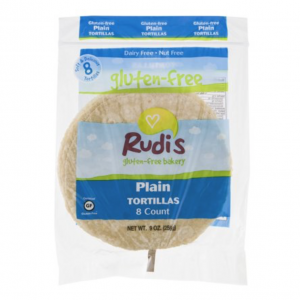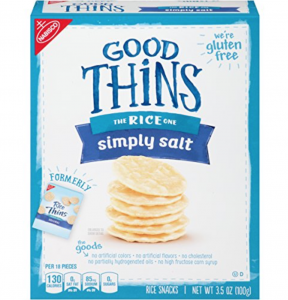By Dr. Sarah Bennett, NMD / December 14, 2018

Since 2004, the gluten free diet has skyrocketed in popularity and is currently one of the most talked about trendy diets to date.
Not only is this diet trendy, many swear that eating gluten free has helped them achieve weight loss, increased athletic performance, decreased disease progress, and increased general health.
Although, Nutritional science is greatly under researched, we are beginning to find significant links between the ingestion of gluten and a multitude of diseases, including but not limited too celiac disease and gluten allergy.
For those with celiac disease or a gluten allergy, a gluten free diet is a necessity… but what is the benefit for those of us with other diagnosis?
Throughout naturopathic medical school, I continually learned about the adverse effects of gluten on many disease processes including one that I developed along the way… hypothyroidism with nodular thyroiditis.
After hearing the benefits of going gluten free for this condition numerous times, I finally decided to take on the task myself.
The effects were not immediate but after a month I began to notice dramatic improvement in my energy, skin, mood, and even dropped a few pounds.
Although, I will always promote a whole foods diet, this transition was made much easier due to the now abundant gluten free grocery and restaurant options.
After personally experiencing the benefits of this diet, I decided to continue researching gluten, leading me to write this article.
What is Gluten and Where is it found
Although, the vast majority of americans have heard the buzz words “gluten” and “gluten-free”, many do not understand what gluten is and where it is found.
Gluten is a wheat protein naturally found in wheat, barley, rye, and some types of oats.
These grains are used to make some of the most highly consumed foods in america… cereals, breads, pastas, and pastries.
…But gluten is found in many more places than these (1).
Vital gluten,the gluten protein which has been separated from wheat flour through a dough washing process, is used as an additive and thickener in many products.
Some of which include ketchup, soy sauce, spices, seasoned foods, and whole wheat products(1).
Some of these products can contain as much as 70% gluten… such as soy sauce.
The wheat consumption rates have been rising since the 1970s due to the mass productions of processed foods and increasing population.
These levels have began to level out since 2000 in conjunction with the growing popularity of the low carbohydrate diet and the gluten free diet.
Historically, a gluten free diet has most commonly been medically recommended for Celiac disease and wheat allergy, yet emerging data continues to find links to other diseases.

The Difference Between Celiac Disease, Non-Celiac Gluten Sensitivity, and Wheat Allergy
Celiac Disease is the most common genetically related autoimmune disease world wild.
It has been diagnosed in 1% of the population with suspicion of many going undiagnosed.(3)
Celiac Disease is a chronic inflammatory autoimmune disease triggered by the ingestion of gluten in genetically predisposed people.
Carrying the HLA- DQ8 and HLA- DQ2 genes increases a person’s likelihood of having Celiac Disease by 85%, yet, the expression of these genes depends on environmental insult.. meaning gluten must be ingested. (2)
Those diagnosed with Celiac Disease have a shockingly high comorbidity rate with other autoimmune diseases.
With an especially high link with lupus, autoimmune thyroiditis, irritable bowel disease, type 1 diabetes, and addison’s disease. (2)
In Celiac Disease the digestion of gluten causes villous atrophy, which typically presents with symptoms of diarrhea, abdominal pain, nutrient malabsorption, weight loss…
neurological defects, and dermatitis herpetiformis can also be part of the symptomatic picture.
The gold standard for diagnosis of celiac disease is based upon the finding of villous atrophy on intestinal epithelial biopsy, but serum test for antibodies can also be performed. (3)
A gluten free diet has been shown to be 100% curative in celiac disease
Reactions to gluten may also be categorized as a wheat allergy.
A wheat allergy is less common than Celiac Disease affecting 0.4% of the population.
It is often found in children, who will often outgrow the allergy by the age of 6.
Wheat allergies often present with baker’s asthma, urticaria, atopic dermatitis, and rhinitis… but may also be more serious causing anaphylactic reactions.(3)
A wheat allergy is determined by elevated IgE antibodies specific to wheat proteins… which may be determined through allergy testing.
Apart from Celiac Disease and wheat allergy a gluten intolerant person may also be classified as Non-Celiac Gluten Sensitivity (NCGS).
NCGS is a diagnosis of exclusion and therefore, both Celiac Disease and wheat allergy must first be ruled out. (5)
NCGS often presents intestinal and extra-intestinal symptoms similar to those of Irritable bowel syndrome (IBS)… including Abdominal pain, nausea, vomiting, bloating, diarrhea, constipation, bloating, headache, brain fog, fatigue, eczema, paresthesia, and cognitive changes.
Similar to celiac disease, All symptoms and disease processes resolve with a gluten free or wheat free diet. (4,6)
Research suggests that NCGS is actually a Non-Celiac Wheat Sensitivity (NCWS)…
meaning symptoms are induced by not only gluten but also non-gluten components of wheat such as fructans. (7)
Fructans are polysaccharide and oligosaccharide carbohydrates that are polymers of the fructose molecule.
Fructans are found in many fruits, vegetables, and grains.
Due to similarity of symptoms NCWS, IBS, and fructose intolerance are often misdiagnosed, meaning that the exact prevalence of NCWS and its implications to various health conditions is unknown. (8)
The Influence of Modern Gluten on Health and Disease
If Celiac disease, wheat allergy, and NCWS are the only medically confirmed gluten related disorders, then why are so many people worldwide going gluten free?
Nutritional science research has more recently found a significant association with gluten and many autoimmune conditions, psychological disorders, fertility issues, and obesity.
It has also been found that, celiac disease has a high incidence of comorbidity with each of these conditions… including but not limited to autoimmune thyroiditis, infertility, Autism, Schizophrenia, obesity, and mood disorders.
Autoimmune thyroiditis
Autoimmune thyroiditis, such as Grave’s Disease or Hashimoto’s Thyroiditis is characterized by elevated thyroid antibodies driving the disease process to destruction of the gland and an imbalance of thyroid hormones.
A gluten free diet has been associated with a significant decrease in antibody levels which in turn decreases the disease process, preserving the thyroid gland. (9,10,11)
Infertility
Infertility continues to affect both men and women at increasing rates across america, and it is well known among OBGYNs that Celiac Disease and infertility tend to go hand in hand.
Sadly, these women are also at greater risk of delayed puberty, amenorrhea, precocious menopause, miscarriages, decreased duration of lactation, endometriosis, and PCOS.
Although, research has not yet determined the association of these conditions with NCGS, many speculate a connection. (12)
Autism
Autism affects 1 in 59 children in the united states and continues to increase in prevalence.
Autism is a neurological development disorder characterized by impaired social interactions and communication, repetitive movements, and often intellectual disability.
Research show that a gluten-free, casein-free diet dramatically improves social interactions, and communications.
Interestingly, this improvements are lost when gluten and casein are reintroduced to the diet. (13, 14, 15)
Psychiatric disorders
The gut-brain connection is now being recognized by the majority of health care practitioners.
Research is finding a strong links between celiac disease, and NCGS and psychiatric disorders.
Gluten sensitivity has been linked to not only anxiety but also specifically social phobia, panic disorder, depression, and related disorders.
Depression has been diagnosed in as many as 8.6% of americans, and shockingly, Suicide is the 10th leading cause of death in the united states and has increased 28% in the last 17 years.
Yet, the most dramatic and robust association between gluten and psychiatric health has been shown in schizophrenia.
Gluten free diets not only improve symptoms of schizophrenia but have also allowed patients to discontinue antipsychotic medication.
A more recent study showed schizophrenic patients who responded to a gluten free diet displayed no autoimmune biomarkers suggesting the symptoms are related to a NCGS rather than celiac disease. (16, 17,18)
Eating Gluten Free
While research continues to find links between gluten and a multitude of diseases, the gluten free diet continues to grow in popularity…
Which has created a multi-billion dollar industry, providing us with an abundant selection of gluten free products and accommodating restaurants.
For those of us that are gluten free this is good news…
I always recommend a whole foods diet over processed foods, but the fact is the more products that are gluten free, the easier it is to avoid gluten in the diet.
This being said, with more options it is difficult to know which products are worth while.
Let me save you some time and recommend a couple of my favorite items:

2. LARA Bars

3. Udi’s bread




In Conclusion..
More and more links are being found between gluten and disease processes.
But, remember that a gluten free diet is not a necessity for everyone.
If you have a condition discuss in this article or believe a gluten free diet may benefit you, consult with your naturopathic physician for guidance in achieving your optimal health.
Resources:
A Grounded Guide to Gluten: How Modern Genotypes and Processing Impact Wheat SensitivityLisa Kucek-Lynn Veenstra-Mark Sorrells – https://onlinelibrary.wiley.com/doi/full/10.1111/1541-4337.12129
A Grounded Guide to Gluten: How Modern Genotypes and Processing Impact Wheat SensitivityLisa Kucek-Lynn Veenstra-Mark Sorrells – https://onlinelibrary.wiley.com/doi/full/10.1111/1541-4337.12129
The Effect of Gluten-Free Diet on Thyroid Autoimmunity in Drug-Naïve Women with Hashimoto’s Thyroiditis: A Pilot Study. R Krysiak-W Szkróbka-B Okopień-https://www.ncbi.nlm.nih.gov/pubmed/30060266
Autism Spectrum Disorder (ASD) https://www.nimh.nih.gov/health/statistics/autism-spectrum-disorder-asd.shtml
Autism Spectrum Disorders – Pediatrics https://www.merckmanuals.com/professional/pediatrics/learning-and-developmental-disorders/autism-spectrum-disorders
Suicide https://www.nimh.nih.gov/health/statistics/suicide.shtml